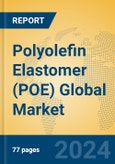Regional Market Trends
- Asia-Pacific: The fastest-growing region, driven by China, South Korea, and Japan. Automotive lightweighting initiatives, photovoltaic (PV) encapsulant demand, and packaging film growth are key factors. By 2030, Asia-Pacific is expected to command the majority share of incremental POE consumption, growing at a CAGR of 4.5%-6%.
- North America: A mature but stable market led by established producers Dow and ExxonMobil. Demand growth is primarily tied to automotive electrification, durable goods, and medical applications, with CAGR projected at 2%-4%.
- Europe: Driven by sustainability regulations and demand for recyclable packaging, as well as medical-grade elastomers. Growth is moderate, with CAGR estimated at 2.5%-3.5% through 2030.
- Middle East: Emerging as a potential supply hub with integrated ethylene capacities, though downstream POE adoption remains slower compared to Asia.
- Latin America and Africa: Smaller markets but with rising demand in packaging and consumer goods, largely import-dependent.
Application Segmentation
1. Automotive:The largest application segment, supported by rising adoption of lightweight polymers in bumpers, gaskets, seals, and interior trims. The shift toward electric vehicles (EVs) amplifies POE demand due to thermal stability and insulation needs. CAGR is estimated at 4%-6%.
2. Packaging Film:
A high-volume growth driver, particularly in food and industrial flexible packaging. POEs enhance film clarity, toughness, and sealability, supporting the sustainability agenda. CAGR projected at 3.5%-5%.
3. Footwear:
A steady application, with POEs used for cushioning, midsoles, and durable yet lightweight components. CAGR expected at 2.5%-4%.
4. Wire & Cable:
Increasing relevance in renewable energy and telecom infrastructure. POEs provide insulation and flexibility, with CAGR in the 3%-5% range.
5. Foam and Household Appliances:
Niche but growing areas where POEs offer durability, elasticity, and chemical resistance. CAGR between 2%-3.5%.
6. Medical Goods:
Emerging growth segment, as POEs provide safe, phthalate-free alternatives for tubing, film, and devices. CAGR forecasted at 4.5%-6%.
7. Others:
Includes adhesives, sealants, and photovoltaic encapsulants, where POEs are increasingly deployed. In particular, solar PV demand is boosting specialty POE grades, growing at 5%-7% CAGR.
Key Market Players
- Dow: A global pioneer in POE production with long-established facilities. Dow leverages strong integration in ethylene production and global distribution, with focus areas in automotive, packaging, and high-performance industrial solutions.
- ExxonMobil: Known for its Exact™ POE brand, ExxonMobil operates at scale in North America and Asia. The company emphasizes innovation in packaging and mobility, expanding downstream collaborations.
- Mitsui Chemicals: Strong in specialty POEs with applications in automotive and consumer goods. The company leverages proprietary catalyst technology for differentiated grades.
- LG Chem: Expanding in Asia, LG Chem targets automotive, footwear, and electronics applications, focusing on high-value elastomers.
- Borealis: With European strength, Borealis integrates POE into its broader polyolefin portfolio, addressing packaging and infrastructure demand.
- Korea Nexlene Company (KNC): A joint venture with 300,000 tons annual POE capacity. Positioned as a leading Asian supplier, benefiting from South Korea’s strong technology base.
- Wanhua Chemical: A rising Chinese leader with aggressive expansion. Its first 200,000 tons/year POE unit started in June 2024, with an additional 400,000 tons/year planned by 2025, positioning the company as a dominant domestic supplier.
- Zhejiang Zhiying New Materials & Licensees: Emerging technology provider, enabling POE capacity development at Rongsheng New Materials (200,000 tons) and Zhejiang Petroleum & Chemical (400,000 tons).
- Hainan Beiouyi Technology: China’s first company to commercialize POE domestically with 30,000 tons annual capacity in 2023, expanding further with a 200,000 tons project in Fujian.
- Sinopec Maoming Petrochemical: A state-owned major, having scaled from pilot trials to a 50,000 tons/year POE facility in 2025. Expected to play a critical role in China’s self-sufficiency strategy.
Porter’s Five Forces Analysis
- Threat of New Entrants - Moderate to High: Capital-intensive projects and technological barriers exist, but the surge of new Chinese entrants indicates growing accessibility to process technology.
- Bargaining Power of Suppliers - Moderate: Dependence on ethylene feedstock ties POE production to broader petrochemical value chains, but integration mitigates risks for large players.
- Bargaining Power of Buyers - High: Automotive and packaging OEMs exert significant influence, demanding performance improvements and cost reductions.
- Threat of Substitutes - Moderate: Competing elastomers (EPDM, EVA, TPU) remain alternatives, but POE’s balance of performance and cost strengthens its position.
- Industry Rivalry - High: Intensifying global and domestic competition, particularly in China, is likely to drive price pressure and differentiation through specialty grades.
Opportunities and Challenges
* Opportunities:- Automotive Electrification: Expanding EV adoption increases demand for lightweight, durable materials.
- Sustainability and Recycling: POEs’ compatibility with polyethylene recycling streams positions them as enablers of circular packaging.
- Solar Photovoltaics: Rapid PV expansion in Asia drives strong demand for encapsulant-grade POEs.
- Medical Applications: Regulatory trends away from phthalates enhance adoption in medical elastomers.
- Overcapacity Risks in China: With over 4 million tons of planned capacity, oversupply may depress margins and intensify competition.
- Feedstock Volatility: Ethylene price fluctuations directly impact POE cost structures.
- Technological Barriers: Advanced metallocene catalyst technology remains concentrated among leading global players.
- Regulatory Compliance: Sustainability regulations may require significant investment in product innovation and recycling systems.
This product will be delivered within 1-3 business days.
Table of Contents
Companies Mentioned
- Dow
- ExxonMobil
- Mitsui Chemicals
- LG Chem
- Borealis
- Korea Nexlene Company
- Wanhua
- Hainan Beiouyi Technology Co. Ltd
- Sinopec Maoming Petrochemical Company








